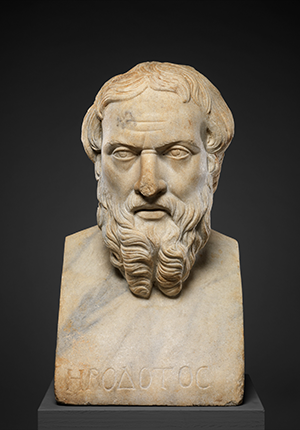Historic Document
The History of Herodotus (ca. 425 BC)
Herodotus | 425 BC

The Metropolitan Museum of Art, New York, Gift of George F. Baker, 1891
Summary
Herodotus of Halicarnassus (ca. 484 – ca. 420 BC) was the author of The Persian Wars (ca. 424 BC). For the Founding generation, Herodotus was of significance for two reasons: first, his celebratory account of the defeat of Achaemenid Persia’s despots Darius and Xerxes by the self-governing Athenians and Spartans and their allies in the Hellenic League; and second, his recounting of a debate concerning the relative merits of democracy, oligarchy, and monarchy that supposedly took place on the eve of Darius’s elevation to the Persian throne. That debate, the earliest example that we have of political theory, helped inspire the democratic instincts of the Americans while providing a foundation for their discomfort with direct democracy.
Selected by

Paul Rahe
Professor of History and Charles O. Lee and Louise K. Lee Chair in the Western Heritage at Hillsdale College

Jeffrey Rosen
President and CEO, National Constitution Center

Colleen A. Sheehan
Professor of Politics at the Arizona State University School of Civic and Economic Thought and Leadership
Document Excerpt
The History of Herodotus 3.80-82
At this meeting speeches were made, to which many of the Greeks give no credence, but they were made nevertheless. Otanes recommended that the management of public affairs should be entrusted to the whole nation. “To me,” he said, “it seems advisable, that we should no longer have a single man to rule over us - the rule of one is neither good nor pleasant. . . . . How indeed is it possible that monarchy should be a well-adjusted thing, when it allows a man to do as he likes without being answerable? Such licence is enough to stir strange and unwonted thoughts in the heart of the worthiest of men. Give a person this power, and straightway his manifold good things puff him up with pride, while envy is so natural to human kind that it cannot but arise in him. But pride and envy together include all wickedness - both of them leading on to deeds of savage violence. True it is that kings, possessing as they do all that heart can desire, ought to be void of envy; but the contrary is seen in their conduct towards the citizens. [H]e sets aside the laws of the land, puts men to death without trial, and subjects women to violence. The rule of the many, on the other hand, has, in the first place, the fairest of names, to wit, isonomy; and further it is free from all those outrages which a king is wont to commit. There, places are given by lot, the magistrate is answerable for what he does, and measures rest with the commonalty. I vote, therefore, that we do away with monarchy, and raise the people to power. For the people are all in all.” . . .
Megabyzus spoke next, and advised the setting up of an oligarchy: - “In all that Otanes has said to persuade you to put down monarchy,” he observed, “I fully concur; but his recommendation that we should call the people to power seems to me not the best advice. For there is nothing so void of understanding, nothing so full of wantonness, as the unwieldy rabble. . . . The tyrant, in all his doings, at least knows what is he about, but a mob is altogether devoid of knowledge; for how should there be any knowledge in a rabble, untaught, and with no natural sense of what is right and fit? It rushes wildly into state affairs with all the fury of a stream swollen in the winter, and confuses everything. Let the enemies of the Persians be ruled by democracies; but let us choose out from the citizens a certain number of the worthiest, and put the government into their hands. For thus both we ourselves shall be among the governors, and power being entrusted to the best men, it is likely that the best counsels will prevail in the state.” . . .
Darius came forward, and spoke as follows: - “All that Megabyzus said against democracy was well said, I think; but about oligarchy he did not speak advisedly; for take these three forms of government - democracy, oligarchy, and monarchy - and let them each be at their best, I maintain that monarchy far surpasses the other two. What government can possibly be better than that of the very best man in the whole state? . . . . Contrariwise, in oligarchies, where men vie with each other in the service of the commonwealth, fierce enmities are apt to arise between man and man, each wishing to be leader, and to carry his own measures; whence violent quarrels come, which lead to open strife, often ending in bloodshed. . . . Again, in a democracy, it is impossible but that there will be malpractices: these malpractices, however, do not lead to enmities, but to close friendships, which are formed among those engaged in them, who must hold well together to carry on their villainies. And so things go on until a man stands forth as champion of the commonalty, and puts down the evil-doers. Straightway the author of so great a service is admired by all, and from being admired soon comes to be appointed king; so that here too it is plain that monarchy is the best government. Lastly, to sum up all in a word, whence, I ask, was it that we got the freedom which we enjoy? - did democracy give it us, or oligarchy, or a monarch? As a single man recovered our freedom for us, my sentence is that we keep to the rule of one. . . .”




